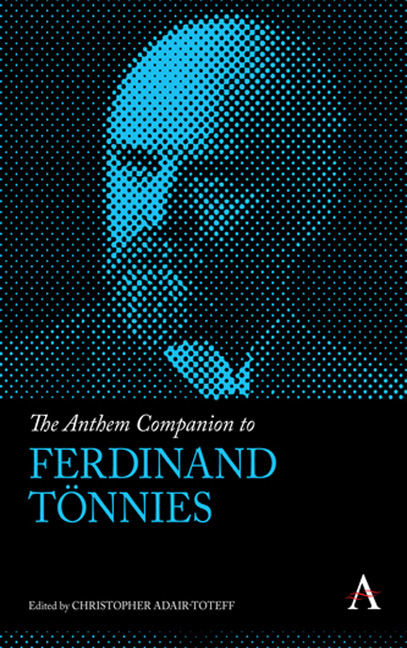Book contents
- Frontmatter
- Contents
- Introduction
- Chapter One Ferdinand Tönnies and the Development of Sociology
- Chapter Two Ferdinand Tönnies and Georg Simmel
- Chapter Three Whither Gemeinschaft: Willing and Acting Together as
- Chapter Four Tönnies and Globalization: Anticipations of Some Central Concerns of Twenty-First Century Sociology
- Chapter Five From Metropolis with Love: Tönnies, Simmel and Urban Social Architecture
- Chapter Six Ferdinand Tönnies: Hobbes Scholar
- Chapter Seven Gender and Family
- Chapter Eight The Power and Value of Public Opinion as a Form of Societal Will
- Chapter Nine The Politics of Ferdinand Tönnies
- Chapter Ten Crime and Law in Gemeinschaft und Gesellschaft
- Contributors
- Index
Chapter Five - From Metropolis with Love: Tönnies, Simmel and Urban Social Architecture
Published online by Cambridge University Press: 22 July 2017
- Frontmatter
- Contents
- Introduction
- Chapter One Ferdinand Tönnies and the Development of Sociology
- Chapter Two Ferdinand Tönnies and Georg Simmel
- Chapter Three Whither Gemeinschaft: Willing and Acting Together as
- Chapter Four Tönnies and Globalization: Anticipations of Some Central Concerns of Twenty-First Century Sociology
- Chapter Five From Metropolis with Love: Tönnies, Simmel and Urban Social Architecture
- Chapter Six Ferdinand Tönnies: Hobbes Scholar
- Chapter Seven Gender and Family
- Chapter Eight The Power and Value of Public Opinion as a Form of Societal Will
- Chapter Nine The Politics of Ferdinand Tönnies
- Chapter Ten Crime and Law in Gemeinschaft und Gesellschaft
- Contributors
- Index
Summary
Introduction
Little has been written on Ferdinand Tönnies's stance on the emergence of metropolis at the turn of the twentieth century; it is rather little when compared with discussions of Georg Simmel's stance on the same concept of urbanity. While refining the search string to be entered into Google's algorithm, this apparent imbalance of scholarly attention is reaffirmed. To my knowledge, there has not been a recorded debate or direct exchange between the two scholars on the topic, even though both were founding figures of the German Sociological Association (cf. Lepsius 2012). Scarce references in their writings convey little about their mutual appreciation (cf. Bond 1991, 337).
Given this fragmentary situation to writings about Tönnies and, to a lesser extent, about Simmel, I will be using a subjective although balanced selection of literature to guide the present chapter, and will focus on two primary texts: Tönnies's Gemeinschaft und Gesellschaft and Simmel's Die Großstädte und das Geistesleben. The other element works with unfamiliar connections made between texts of different periods. The aim is to make Simmel and Tönnies as contemporary as they deserve to be, particularly in the context of urbanism. Translations, unless otherwise stated, are my own; so are extensions in quotes.
Our exploration starts with the unusual connection between Tönnies's Gemeinschaft und Gesellschaft and the suburban forces of metropolitan growth. This chapter takes this as its starting point, and will then connect Tönnies's theory of Willen and Georg Simmel's metropolis, going back in time more than 100 years. It will take a turn and shoot past the present—in relation to Marc Augés non-places—and into the future. This chapter concludes with the suggestion that the fragmented, postmodern metropolis may be giving way to a neomodern extended region where new forms of networks and socio-spatial principles renew urban space. We will see what happens to Tönnies and Simmel when walking such a timeline. While this all sounds confusing, it seemed the most appropriate way to inscribe an almost blank canvas.
From 2000s Gemeinschaft to 1900s Gesellschaft
The twenty-first century continues to see metropolitan growth in suburbia, in large, fastgrowing, suburban cities.
- Type
- Chapter
- Information
- The Anthem Companion to Ferdinand Tönnies , pp. 99 - 118Publisher: Anthem PressPrint publication year: 2016



